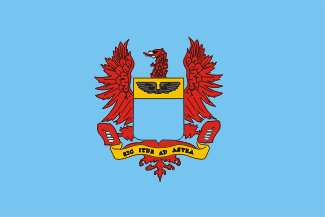
image by Jaume Ollé, 5 November 2001

Last modified: 2010-02-19 by dov gutterman
Keywords: colombia | air force | roundel | fin flash |
Links: FOTW homepage |
search |
disclaimer and copyright |
write us |
mirrors

image by Jaume Ollé, 5 November 2001
See also:
I located the Air Force flag
at <elpibe.urc.net.co>.
Esteban Rivera , 19 May 2000
The flag with the crest and white background seems to be the
official one. They probably changed it since I remember
seeing the same coat of arms but on a different background (more
like a light blue one). In every TV appearance of the Air Force
flag, I have always seen that flag.
Esteban Rivera, 30 May 2000
Photo of the flag at <www.fac.mil.co/simbolos>,
arms at <www.fac.mil.co>.
Jaume Ollé, 24 November 2001
A government decree no. 126 of 31 December 1919 to form
aviation element of Army was the first step for the
establishement of Fuerza Aérea Colombiana. On 4 April 1922
Aviacion Militar was formed and it was renamed in 1943 Fuerza
Aérea Nacional and renamrd again in 1947 to its current name.
Homepage at <www.fac.mil.co>
.
Dov Gutterman, 14 June 2004
The FAC flag was established by Resolution on May 24, 1971.
Source: <www.fac.mil.co>.
E. R., 7 July 2008
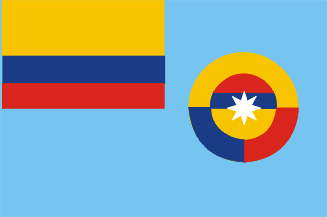
image by Jaume Ollé, 5 November 2001
Light blue, the national flag in the canton, the air force
roundel (8 points star) in the fly.
Source: Christian Fogd Pedersen: Moussault's lexicon
van vlaggen en wapens (Alverdens flag i farver), 1980 [ped80].
Mark Sensen , 22 June 1997
Air Force ensign: Light blue field with national flag in
canton and roundel (5 points star) at lower fly
Source: Album des Pavillons (1995) [pay].
Ivan Sache , 12 August 1999
I have two books on roundels, both of which say that the star
has had five points since the nineteen-fifties. One says that
before that time the star had ten points
John Ayer, 14 September 1999
From <www.geocities.com/Pentagon/7978/facres/simbolos.htm>:
ENSIGN (Roundel): This is the ensign that the Colombian Air Force
uses since 1950 in all and each one of its aircraft which goes by
the following pattern: On top of the left side (wing), below the
right side (wing) and on the tail, one on each side. In the
middles it has a five-pointed white star and on its borders is
the national tricolor inverted.
Esteban Rivera, 30 May 2000
In Znamierowski's book [zna99]
at p. 85: the text states: "...and Colombia have the air
force emblem in the centre", but the picture shows the air
force flag with the roundel, not an air force emblem
Marcus Schmoger, 16 July 2000
The image is probably of the old flag at top and the text is
about the Air Force New Flag
Dov Gutterman, 17 July 2000
The Album 1995 issue [pay] show
another flag wich is omitted from Album 2000 [pay00], but I think only due to the
editorial policy and not because the flag is obsolete. That is
the Air Force Ensign, of the clasical pattern - light blue with
the national flag in canton and the roundel in fly. I think that
this flag is not obsolete indicated, and that the Air Force flag
of different design does not replace it - this other flag serve
entirely different function - it is the flag of the Air Force as
a branch of the defence forces, in the same way as there are
similar flags for other branches.
Željko Heimer, 23 May 2001
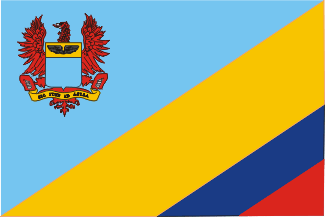
image by Jaume Ollé, 5 November 2001

Air Force (FAC)
image by Carlos Thompson, 2 June 2003
In the front dor of the Military Hospital, in Bogota,
Colombia, there are three flags in plain color: dark blue, light
blue and red. I supose that the flags are just versions without
the coat of arms, of the flags of the Army (EJC), Navy (ARC) and
Air Force (FAC).
Carlos Thompson, 2 June 2003
Ant?nio Martins wrote: "These seem to follow the
british pattern...". Given that Colombia military airfield
flag follows a British pattern: sky blue flag with national flag
in the canton and roundel in the fly; and that Britain had a lot
of influence in Latin America post independence, that would be a
fair guess.
Carlos Thompson, 3 June 2003
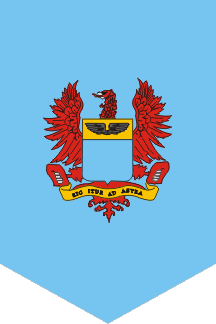
image by Jaume Ollé and Eugene Ipavec, 19
August 2008
Flag spotted on 6 June 2008 at Eldorado Airport, Bogota. It
was hanged on an hangar and I believe that it belongs to one of
two Air Force units: CAMAN or CATAM that are located in this
airport.
E.R., 19 August 2008
air.gif)
image by Jaume Ollé, 5 November 2001
This is the Colombian Air Force's Crest. It reads "Sic
Itur Ad Astra", which means "Like this you go to the
stars".
Esteban Rivera , 19 May 2000
From <www.geocities.com/Pentagon/7978/facres/simbolos.htm>:
THE EAGLE OF GULES: She was made the symbol of aviation
itself. As the queen of all birds she is the symbol of the
empire that the AIR ARM exerts over Colombian skies, winds and
storms; she is a living image of the power and freedom of our
fatherland. Her color is gules or blood and/or fire red, that war
or martyr heroes have; it speaks clearly about the transparence
and energy of love. It also shows the strength of the
spirit and and the ability to dread, primary virtues of those who
are part of the Colombian Air Force and incarnates in its blason
, manhood, victory, valor, ellegance and courage. The center of
the crest is in Azure (Turqueoise Blue) with an horizontal chief
that holds two sabre blades, meaning guard, truth, loyalty
and beautifulness. Its title, also in gold, says "SIC ITUR
AD ASTRA" which translates "Like this you reach the
heigths". The golden color symbolizes the "light
and commitment, the greatness and wisdom". This is, at a
glance, the formidable heraldry of the crest that was made into
the symbol of our institution. Its motto was taken from
Eneida de Virgilio in his book IX, Chapter V. The crest's origin
was from a contest promoted by the Colonel Arturo Lema Posada,
then commander of the military aviation and formalized by the
Decree No. 2963 of the 26th of December of 1944, being President
of the Republic Alfonso López Pumarejo and Minister of War
(Today Minister of Defense), General Domingo Espinel.
E. R., 30 May 2000
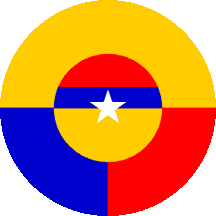
image by Željko Heimer, 23 May 2001
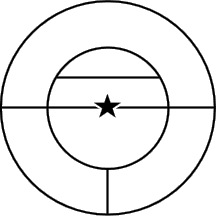
Low-visibility version
image by Eugene Ipavec, 13 December 2005
According to [pay00] -
Aircraft Marking - A note to the figure explains that the
national flag is painted on the fin as Fin Flash.
The marking is a roundel divided horizontally and lower part
again vertically in yellow, blue and red and in the center
covered with a disk divided horizontally in red, blue and yellow
(yellow covering the whole lower half), and over it in the middle
a white star. The star is a five-pointed star in Album 2000. In
Album 1995 the star is of eight points, and as far as I have
observed - ight-pointed star is preffered star shape throughout
the Colombian history - so I am inclined to believe that the
five-pointed star in Album 2000 might be an error. Other source
by hand is [zna99] with
eight-pointed star also.
Željko Heimer, 23 May 2001
According to Cochrane - military aircraft insignia [cos98], the star was changed to 5
points in 1953. Wheeler Aircraft Markings [whe86] also gives 5 points in 1986.
Armand du Payrat, 25 May 2001
A government decree no. 126 of 31 December 1919 to form
aviation element of Army was the first step for the
establishement of Fuerza Aérea Colombiana. On 4 April 1922
Aviacion Militar was formed and it was renamed in 1943 Fuerza
Aérea Nacional and renamrd again in 1947 to its current name.
Homepage at <www.fac.mil.co>
.
According to [cos98], since 1925
the FAC use its complicated roundel, and the only change was in
1953 when the star was changed to 5 points star and instead of a
roundel as fin flash, came rudder stripes. See: <www.skytamer.com>
(1925-1953) and <www.skytamer.com>
(post 1953). Jane's 1945 report 8 points star and national colors
as rudder stripes. [whe86] report
a 5 points star an a sqare fin flash. <www.aeroflight.co.uk>
also report 5 points. Photo at <www.airliners.net/240294>
show clearly a 5 points star as well <www.airliners.net/240293>
. Unfortunally, old photos are so unclesr and the star so small,
so I can't have a good one. We shall have to trust the books on
this. The rudder stripes are used on uncamoflagued planes. Combat
planes carry a small flag as fin flash (see <www.scramble.nl>).
Dov Gutterman, 14 June 2004
The low-visibility version differs somewhat in layout from the
regular roundel, too - the inner ring is a bit larger, and the
cental star noticeably smaller.
Source: photo at <www.fac.mil.co>,
reported by E.R.
Eugene Ipavec, 13 December 2005
There are several roundels used throughout the years, as seen on the FAC official website (All of the roundels that featured on this website and the explanation of them are extracted from the book: "75 Años en los Cielos Patrios", published by Editorial Margabby Ltd., First edition in 1994, by FAC Lt. Col. (r) Oscar Forero Racines):
First roundel (1920-1924)
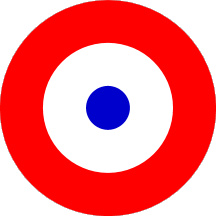
image by Eugene Ipavec, 22 December 2009
Second roundel (1924-1927)
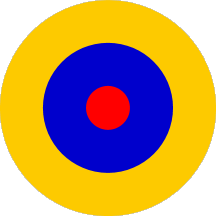
image by Eugene Ipavec, 22 December 2009
Third roundel (1927-1953)
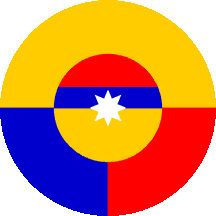
image by Željko Heimer, 23 May 2001
Third roundel. Established by Decree No. 289 of February 21,
1927 (1927-1953).
Fourth roundel- 1953-present (above).
Roundels are seen also on the FAC
official website
E.R., 7 July 2008 and 22 December 2009
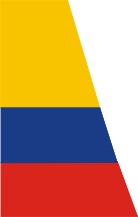
image by Jaume Ollé, 5 November 2001
Fuerza Aerea Colombiana uses a thiner vertion of the
national flag as its fin flash.
Source: B. C Wheeler, An Illustrated Guide to Aircraft
Marking (1986) [whe86].
Dov Gutterman , 8 October 1999
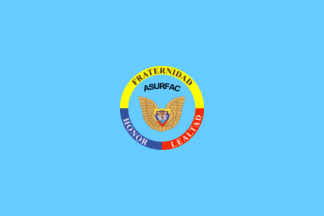
Flag
image by Eugene Ipavec, 10 August 2009
.gif)
Coat of Arms
image by Eugene Ipavec, 10 August 2009
ASURFAC (Asociación de Suboficiales en Retiro de la Fuerza
Aérea Colombiana, Retired NCO's of the Colombian Air Force) is
an organization that has its own symbols. It consists of the
plain Air Force flag pattern with the Coat of Arms of the ASURFAC
on the middle.
E.R., 10 August 2009
The Acción Social FAC Nuestra Señora de Loreto (FAC Social
Action Our Lady of Loreto) is a non profit organization made up
of wives of Air Force Active and Retired Officers that work
voluntarily to support the families of the homes of the most in
need of the Air Force. It was established in 1972
The Lady of Loreto was chosen because it represents protection
for the houses and the families that live there
Sources: <www.fac.mil.co>,
<www.corazones.org>
and wikipedia
The Logo can be seen on the header of the website they have. The
flag is on a horizontal plain yellow background with the logo on
the middle, as seen in the pictures:
E.R., 10 December 2009